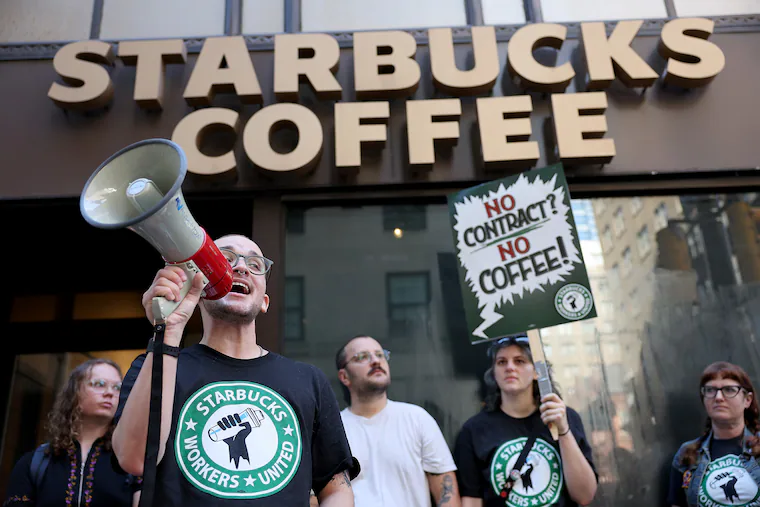
About 35 unionized Starbucks workers and supporters from other unions gathered Sunday in Center City, with a message summed up in a four-word chant: “No contract? No coffee.”
The baristas are part of a growing pool of union members among the coffee giant’s U.S. labor force. The union, Starbucks Workers United, has been bargaining its first union contract with Starbucks since 2021.
Now, amid sudden closures to hundreds of Starbucks locations nationwide, the union members say they’re getting ready to strike, just in time for the holiday season.
“The last thing Starbucks needs is a strike on its hands,” said Yuna Miyamoto, a barista at the Starbucks in Chestnut Hill. “But we have the will, and we have the numbers.”
Standing in front of the Starbucks at 16th and Walnut Streets, Workers United organizer Alex Riccio said they plan to “shut down as many union locations as possible” if the company doesn’t return to the bargaining table to negotiate higher wages, staffing levels, and health care benefits. To do this, Riccio said, the union has already elected 400 “strike captains” nationwide.
» READ MORE: Starbucks will lay off about 900 employees and close over 100 stores. Here’s what to know.
Silvia Baldwin is one of these strike captains. She’s a barista at the 3401 Walnut St. Starbucks, a store where the union won its election in 2022.
Baldwin said the company should make “a real good-faith offer” if it wishes to avert a strike. To her, that starts with wages.
“When you give a majority of your working hours and your lifeblood to anything, you should really be able to make ends meet,” she said.
Starbucks CEO Brian Niccol has said the sweeping closures are part of a plan to bring back a more welcoming atmosphere to stores. The coffee chain has seen sales decline for six consecutive quarters at stores open for at least a year, according to The New York Times, and the company’s shares have fallen about 12 percent in the past year.
“Our ‘Back to Starbucks’ investments — like $500 million to put more partners in stores, 18 weeks of parental leave, and industry-leading benefits that add up to about $30 an hour — are helping us keep turnover at record lows and making Starbucks a place more partners recommend as a great place to work,” spokesperson Andrew Tull told The Inquirer.
But the closures have also added to union members’ concerns. In Philadelphia, six stores have closed. Three of these — 1801 Spruce St., 1709 Chestnut St., and 1500 Market St. — are not unionized. Three others — 1900 Market St., 1201 Walnut St., and 490 N. Broad St — are unionized.
The union is looking to bargain for the baristas who worked at these locations, Baldwin said; that may include getting moved to another store, or getting severance benefits.
Baristas have noticed that the sudden store closures also are adding to an uptick in customers at the remaining stores, said Noah Dixon, who works at the Starbucks where the rally was held. And since staffing hasn’t increased, he said, many workers are concerned about the potential impact on customers and store cleanliness..
Any problems are only likely to get worse during the busy holiday season, Dixon added.
» READ MORE: Chestnut Hill Starbucks joins wave of unionized Philly stores
The union is considering timing a strike action around “Red Cup Day,” an annual promotional event in November where customers get a reusable, holiday-themed red cup with their purchase, he said.
It wouldn’t be the first time the company went on strike around the holidays. On Christmas Eve last year, Philadelphia Starbucks workers steered customers to other coffee shops while picketing in Center City.
Still, the union and Starbucks have had some success, Dixon said. The two parties successfully reached about 30 “tentative agreements” on contract issues last year.
However, when the union began introducing contract proposals for staffing, wages, and healthcare, things slowed down, Dixon said. The company offered a 1.5% pay increase, which amounted to about 50 cents per hour. Dixon, who earns $16.83 per hour, said his wage has gone up 30 cents over the past three years.
“We are fighting to bring them back to the bargaining table, with real proposals,” he said.



